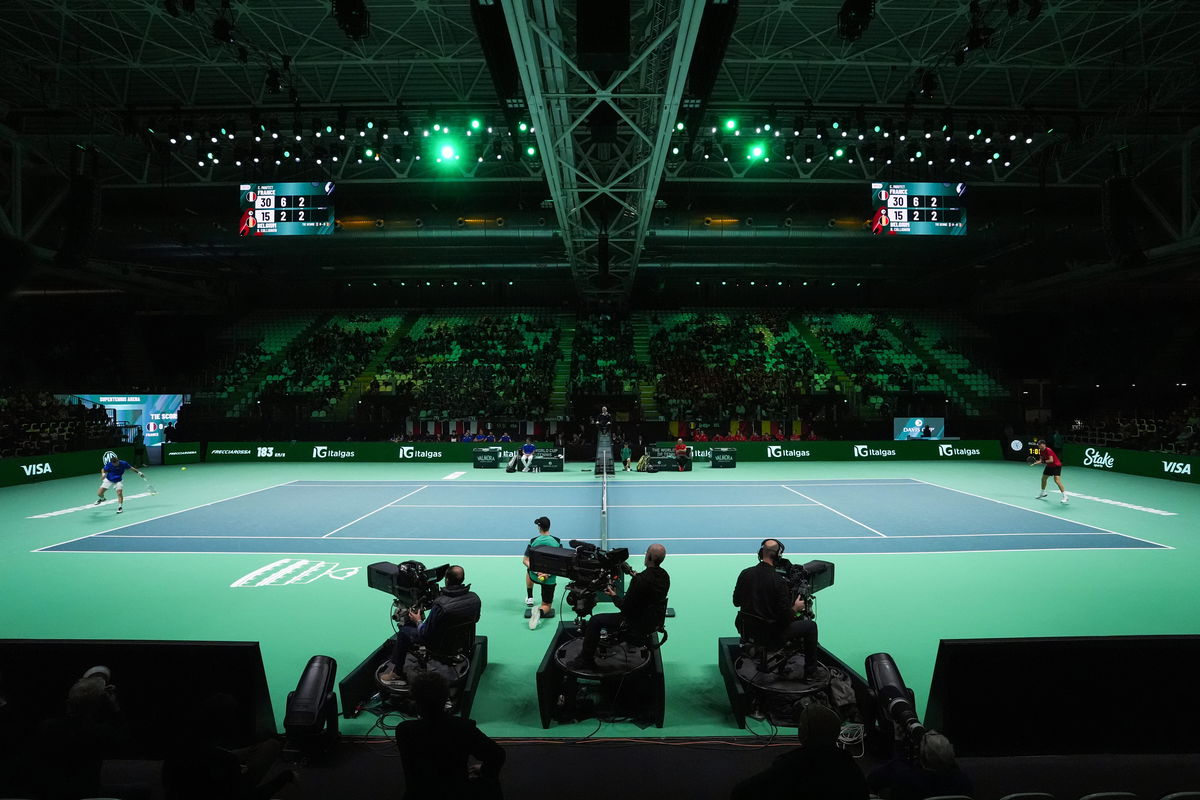Nov 19, 2025 | 8:12 AM EST

Imago
Corentin Moutet and Raphael Collignon in action during Davis Cup Finals 2025 Quarterfinals match between Corentin Moutet France and Raphael Collignon Belgium at Bologna Fiere, Bologna, Italy – November 18, 2025. – Tennis. PUBLICATIONxNOTxINxITAxFRAxCHN Copyright: xMassimoxPaolone/LaPressex

Imago
Corentin Moutet and Raphael Collignon in action during Davis Cup Finals 2025 Quarterfinals match between Corentin Moutet France and Raphael Collignon Belgium at Bologna Fiere, Bologna, Italy – November 18, 2025. – Tennis. PUBLICATIONxNOTxINxITAxFRAxCHN Copyright: xMassimoxPaolone/LaPressex

Imago
Corentin Moutet and Raphael Collignon in action during Davis Cup Finals 2025 Quarterfinals match between Corentin Moutet France and Raphael Collignon Belgium at Bologna Fiere, Bologna, Italy – November 18, 2025. – Tennis. PUBLICATIONxNOTxINxITAxFRAxCHN Copyright: xMassimoxPaolone/LaPressex

Imago
Corentin Moutet and Raphael Collignon in action during Davis Cup Finals 2025 Quarterfinals match between Corentin Moutet France and Raphael Collignon Belgium at Bologna Fiere, Bologna, Italy – November 18, 2025. – Tennis. PUBLICATIONxNOTxINxITAxFRAxCHN Copyright: xMassimoxPaolone/LaPressex
The conclusion of the 2025 tennis season has dealt a significant blow to the Davis Cup Finals, with the world’s top two players, Jannik Sinner and Carlos Alcaraz, withdrawing from the prestigious team event. Sinner, who led Italy to victory in the past two campaigns, opted to skip the tournament held in Bologna to prioritize his preparation for the upcoming season. For Carlos Alcaraz, the reason for withdrawal was physical, citing a medical recommendation following an injury sustained during the ATP Finals in Turin.
Watch What’s Trending Now!
In the face of these high-profile absences, ITF CEO Ross Hutchins has moved to defend the tournament’s value and format. Rather than focusing on the missing stars, Hutchins emphasized the broader positive participation trends and the importance of listening to the national federations. As reported by Ubitennis, Hutchins struck a positive tone, stating, “The nations are the ones that we also have to listen to and there’s been huge support. More players have played this year than ever before … a huge amount of nations are participating in this competition and therefore, we have to embrace that side of the thinking as well.”
He also addressed potential concerns about collaboration within the sport, adding, “We do have close relationships with the other governing bodies in tennis. We do have close relationships with players. We’re willing to have the conversation across anything that comes to their minds.”

Reuters
Tennis – Davis Cup – Finals – Czech Republic v Australia – Palacio de deportes Martin Carpena, Malaga, Spain – November 22, 2023 Australia’s Alex de Minaur in action during his quarter final match against Czech Republic’s Jiri Lehecka REUTERS/Violeta Santos Moura
The Davis Cup has undergone a radical transformation in recent years, shifting from a traditional year-long home-and-away format to a more condensed World Cup-style finals event. This overhaul, passed by the ITF in 2018, was controversially approved with a promised $3 billion investment and was intended to make the competition more appealing to top players.
However, the continued absences of the sport’s biggest names raise questions about whether the revamp has achieved its goal. Players like Sinner have also chimed in and offered advice for the tournament’s schedule to make it more accessible.
Jannik Sinner’s suggestion for the Davis Cup
“Yeah, I mean, Davis Cup is a very interesting topic. Every player has its own opinion. I think playing with this schedule, Davis Cup, it’s difficult that you have every year from every country the best players in the world,” Jannik Sinner shared, highlighting the challenge with the event.
The Italian shared his thoughts on a new structure, proposing a two-year cycle that could make the competition more exciting and easier to manage. He mentioned, “What I would like, what I could see potentially in the future, is having Davis Cup throughout two years, so you can also set up the semifinals in the beginning of the year and the final in the end of the year somewhere.”
He went on to say, “It’s also nice where you can choose, make the coin toss, whatever, and you play in this stadium, and you sell tickets. Like this, if you play in Bologna, there is the matchup Australia against U.S., of course there are going to be spectators. I’m not saying that. But in the same time, why not making it a real Davis Cup competition?”
While Hutchins and the ITF are really pushing for the Davis Cup and getting a lot of national support, the fact that Alcaraz and Sinner have pulled out highlights the ongoing struggle between this classic team event and the personal career choices that today’s top players have to make. And maybe, listening to what one of the top tennis players has to say about the event might bring the change that is actually needed.



